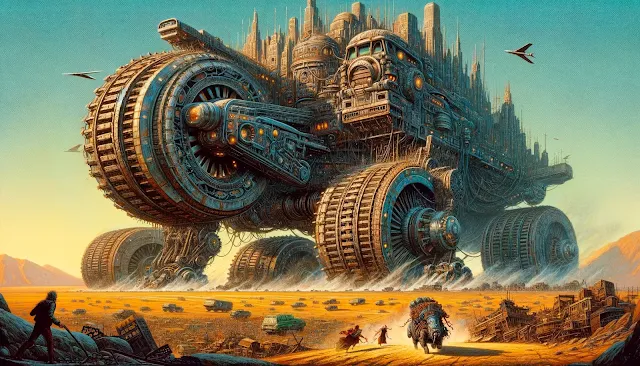Philip Reeve's "Mortal Engines," published in 2001, is more than a thrilling adventure; it's a profound thought experiment. The novel uses its extraordinary premise—colossal, predatory cities on wheels—as a powerful lens to dissect the cycles of consumption, power, and historical amnesia that define human civilization. Every theme in this vividly imagined world, from environmental ruin to the search for identity, is a direct consequence of its single, brilliantly twisted core concept: Municipal Darwinism.
Municipal Darwinism: The Engine of Society
At the heart of "Mortal Engines" is the philosophy of Municipal Darwinism, a savage satire of industrial capitalism and colonialism taken to its horrifyingly literal conclusion. This isn't just a world of survival; it's a world where "survival of the fittest" has become a state-sponsored religion. The great predator city of London doesn't just outcompete smaller towns; it hunts them down, drags them into its "Gut," and systematically disassembles them for parts and fuel. Their citizens are either enslaved or forcibly assimilated into the bottom tiers of London's rigid class system.
This ideology physically shapes society. London is a tiered layer cake of inequality. The powerful Historians and Engineers reside at the top, pursuing knowledge and power, blissfully detached from the brutal reality of the city's consumption. Below them, the working classes toil, while at the very bottom, in the smoke and fire of the engine rooms, the city's hunger is sated. This system, Reeve argues, is inherently unsustainable and built on a foundation of exploitation. The stark contrast to this is the Anti-Traction League, a civilization that chooses stasis over motion, sustainability over consumption, creating the book's central ideological war.
The Ghosts of Technology: History as a Weapon
The entire world of "Mortal Engines" is haunted by the ghosts of its "Ancients." The scarred, barren landscape is a direct result of the Sixty Minute War, a cataclysm caused by a level of technological advancement that outpaced moral wisdom. This makes the theme of environmental degradation a form of historical memory; the Earth itself is a constant reminder of humanity's past sins.
This theme is crystallized in the plot's central artifact: the superweapon MEDUSA. Thaddeus Valentine's obsessive quest to rebuild this piece of "Old-Tech" is the ultimate expression of cyclical history. Rather than learning from the apocalypse, he seeks to harness its power. It shows that humanity is not just doomed to repeat its history but is actively, ambitiously seeking to do so. Technology in "Mortal Engines" is not a neutral tool; it is a cycle of destruction that society is desperate to restart, believing this time, they can control the outcome.
Forging an Identity From the Scars of the Past
The characters' journeys are a direct reflection of these larger themes. Tom Natsworthy begins as a Historian who cherishes the past as a collection of curiosities. His harsh awakening in the Out-Country forces him to confront the bloody reality behind his artifacts. He learns that history is not a passive subject but an active force of violence and injustice, and his transformation is about finding his own moral compass within that chaos.
Hester Shaw, conversely, wears the past on her face. Her horrific scar is a literal and metaphorical symbol of history's wounds. In a world where London hides its brutality behind civic pride, her disfigurement is an undeniable mark of truth. Her quest for vengeance against Valentine is a rebellion against his attempt to sanitize and control the historical record. Her arc is about discovering if she can be more than her trauma, if she can build a future that is not solely defined by the scars she carries.
This fusion of history, technology, and identity is perfectly embodied in the Stalker Shrike. He is a piece of Old-Tech, a resurrected soldier from a forgotten war, whose entire existence is driven by a broken memory. He is a literal "Remembering Machine," a ghost in the mortal engine, serving as a constant, terrifying reminder that the past is never truly dead.
A Lasting Legacy
"Mortal Engines" has garnered immense critical acclaim, winning the Nestlé Smarties Book Prize and the Guardian Children's Fiction Prize. Its enduring influence comes from its masterful use of a fantastical premise to hold a mirror to our own world. It is a thrilling adventure that asks profound questions about our society's insatiable consumption, our troubled relationship with history, and our frightening capacity to repeat our most devastating mistakes.


















